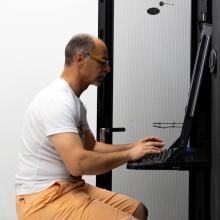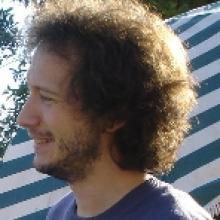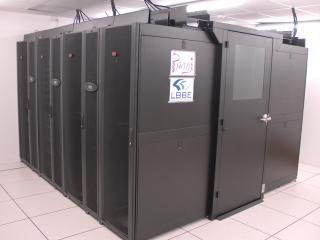Computing services
Members
Ingénieur d'études
CNRS
Tel: 04 72 44 81 42

Ingénieur d'études
CNRS
Tel: 33 04 72 43 11 68

Ingénieur d'études
CNRS
Tel: 04 72 43 35 82

Technicien
UCBL
Tel: 33 04 72 43 29 04

Ingénieur d'études
CNRS
Tel: 33 04 72 43 29 04

Ingénieure de recherche
UCBL
Tel: 33 04 72 44 85 98

Ingénieur de recherche
CNRS
Tel: 33 06 82 87 93 59

Ingénieur de recherche
CNRS
Tel: 33 04 26 23 44 70
info@listes-lbbe.univ-lyon1.fr
The "Pôle informatique" (hereafter called "PI") is constituted of 8 engineers (1T, 4IE, 3IR). Our activities are distributed among three main directions: computing and storage infrastructure management (shared resources, and invidual equipment), software and service development and data analysis in molecular biology and ecology.
Infrastructures managment
- Microcomputing: the PI is in charge of managing the laboratory's microcomputer equipment, from choosing the most appropriate solution in consultation with the future user to managing maintenance, including installation and configuration of the equipment.
- Laboratory Information System: the PI provides laboratory and community members with a number of services, including several web servers (apache), numerous database servers (relational or indexed) and several collaborative tools (Git, Redmine, Seafile...). These services are hosted on largely virtualized machines.

- Compute and storage: since 2009, the PI manages a computing cluster with almost 1200 avalaible computing cores. The cluster is linked to a 600 TB high performing distributed storage system under BeeGFS and an object mode storage based on iRods (~400 useful TB).
- Cloud and containerization: cloud-girofle (224 vcpu and 120 To), the local cloud operated by the PI since 2017, is part of the Biosphere cloud federation from the French Institute of Bioinformatics (IFB). We are starting to converge our virtualization infrastructure towards containerization technologies (docker, singularity).
- User support: the PI provides user support for all the resources and tools available to the laboratory's members. It trains and supports users in their use of shared resources through trainingsessions, information and monitoring meetings and mailing lists.
Software and methodological development
Members of the PI are involved in numerous software development projects in collaboration with the lab researchers, covering a large range of programming languages (R, Python, C++, OCaml, Javascript, SQL, shell). It goes from optimized parallel numerical codes to web services and dedicated databases (SQL or no-SQL). A peculiar effort is also performed to share the best practices of modern software development and make these software codes reproducible and available following the standards and requirements of the community.
Data analysis
Members of the PI are in the front line facing the data avalanche (and the data diversity) of this decade.
A large part of our activity is related to the quantity of data coming from sequencing technologies. The PI develops and proposes pipelines for genomic data assembly and annotation, RNA-seq and RAD-seq data analysis. More recently, computer image processing has become an important issue for future ecological studies performed in the lab in the Evolutionary Ecology.
Animation, training and scientific expertise
Our group has set up a series of dedicated workshops to improve internal skills in software engineering, distributed computing, programming and data analysis, which complements more formal teaching sessions. Members of the group are also involved in training activities in universities (UCBL1) and CNRS (Formation permanente).
In their respective fields, members of the PI actively monitor technological developments and participate in major events such as JOBIM (bioinfo), the JRES (system administration), the JDEV (development), the Aramis days (system and network administration and software development) and the 'Rencontres R' (programmation). The PI is also involved in dedicated networks and/or projects of national scope such as the LyonCalcul group, the RLyon group and the IFB-NNCR and IFB-Core projects.
We works in close cooperation with the bioinformatics platform PRABI (Pôle Rhône-Alpes de BioInformatique), notably for the management of the computing and storage infrastructure, the diffusion of our lab's software production, the organization of teaching sessions and for sharing expertise in genomic/transcriptomic data analysis.
Poster
Publications
Display of 121 to 150 publications on 170 in total
Genetic structure and linkage disequilibrium in 4 species of the Vitis genus
Génoplante .
Poster
see the publicationVirHostNet : a knowledge base for the management and the analysis of proteome-wide virus-host interaction networks
Nucleic Acids Research . 37 : D661-D668
DOI: 10.1093/nar/gkn794
Journal article
see the publicationDatabases of Homologous Gene Families for Comparative Genomics
BMC Bioinformatics . 10 (Suppl.6) :S3 : 13
Journal article
see the publicationRemote access to ACNUC nucleotide and protein sequence databases at PBIL
Biochimie . 90 ( 4 ) : 555-562
Journal article
see the publicationDigiPINS: A database for vertebrate exonic single nucleotide polymorphisms and its application to cancer association studies
Biochimie . 90 ( 4 ) : 563-569
Journal article
see the publicationDigiPINS: a database for vertebrate exonic single nucleotide polymorphisms and its application to cancer association studies.
Biochimie . xxx : 563-569
Journal article
see the publicationLagrangian approaches for a class of matching problems in computational biology
Computers & Mathematics with Applications . 55 ( Issue 5 (March 2008) ) : 1054-1067
Journal article
see the publicationInferring the role of transcription factors in regulatory networks
BMC Bioinformatics . 9 : nc
Journal article
see the publicationPervasive positive selection on duplicated and nonduplicated vertebrate protein coding genes
Genome Research . 18 : 1393-1402
Journal article
see the publicationDétection de domaines dans des séquences génomiques : un problème de couverture optimale
FRANCORO V/ROADEF 2007 .
Conference paper
see the publicationChecking Consistency Between Expression Data and Large Scale Regulatory Networks: A Case Study
: 14
Report
see the publicationOptimiser un plan d'expérience à partir de modèles qualitatifs?
Biofutur . 275 : 27-31
Journal article
see the publicationModélisation grande échelle de réseaux biologiques : vérification par contraintes booléennes de la cohérence des données
Thesis
see the publicationQualitative response of interaction networks: application to the validation of biological models
6th International Congress on Industrial and Applied Mathematics. ICIAM 07 . : nc
Conference paper
see the publicationChecking Consistency Between Expression Data and Large Scale Regulatory Networks: A Case Study
Journal of Biological Physics and Chemistry . 7 : 37-43
Journal article
see the publicationPath-equivalent developments in acyclic weighted automata
International Journal of Foundations of Computer Science . 18 ( 4 ) : 799-812
Journal article
see the publicationQualitative, integrated modeling of lipid metabolism in hepatocytes
7th International Conference on Systems Biology - Yokohama . : Inconnu
Poster
see the publicationTopology and static response of interaction networks in molecular biology
Journal of the Royal Society Interface . 3 ( 6 ) : 185 - 196
Journal article
see the publicationLagrangian Approaches for a class of Matching Problems in Computational Biology
Report
see the publicationQualitative analysis of the relation between DNA microarray data and behavioral models of regulation networks
BioSystems . 84 : 153-174
Journal article
see the publicationLagrangian Approaches for a class of Matching Problems in Computational Biology
: 18
Report
see the publicationITTACA: a new database for integrated tumor transcriptome array and clinical data analysis
Nucleic Acids Research . 34 ( 90001 ) : D613-D616
DOI: 10.1093/nar/gkj022
Journal article
see the publicationPath-Equivalent Removal of Epsilon-Transitions
11th International Conference on Implementation and Application of Automata (CIAA 2006) . : 23--33
DOI: 10.1007/11812128_4
Conference paper
see the publicationTree pattern matching in phylogenetic trees: automatic search for orthologs or paralogs in homologous gene sequence databases.
Bioinformatics . 21 ( 11 ) : 2596-603
Journal article
see the publicationIntegr8 and Genome Reviews: integrated views of complete genomes and proteomes.
Nucleic Acids Research . 33 ( Database issue ) : D297-302
DOI: 10.1093/nar/gki039
Journal article
see the publicationComplex Qualitative Models in Biology: a new approach
Complexus . 2 : 140-151
Journal article
see the publicationPolymorphix: a sequence polymorphism database
Nucleic Acids Research . 33 : 481-484
Journal article
see the publication